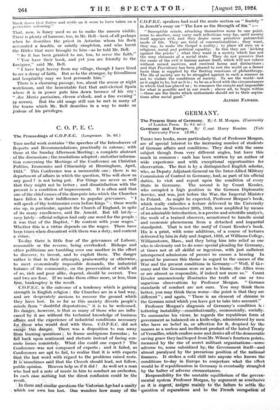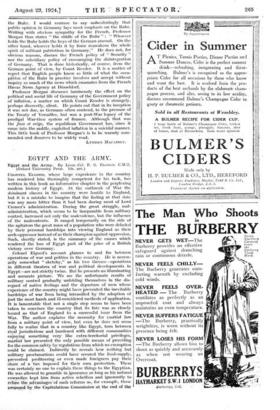GERMANY.
TIIESE two books, more particularly that of Professor Morgan, are of special interest to the increasing number of students of German affairs and conditions. ' They deal with the same subject though from very different angles, but have this much in common : each has been written by an author of wide experience and with exceptional opportunities for observation. The first is by a distinguished English seholar, who, as Deputy Adjutant-General on the Inter-Allied Military Commission of Control in Germany, had, as part of his official duties, to visit and report upon the condition of every State in Germany. The second is by Count Kessler, who occupied a high position in the German Diplomatic Service, and was, just before the War, the Imperial Minister to Poland. As might be expected, Professor Morgan's book, which really embodies a lecture delivered in the University of London on November 20th, 1923, now amplified by means of an admirable introduction, is a precise and scientific analys's, the work of a trained observer, accustomed to handle social and economic phenomena from a detached and impartial standpoint. That is not the motif of Count Kessler's book. His is a print, with some additions, of a course of lectures delivered by him in July and August, 1923, at Williams College, Williamstown, Mass., and they bring him into relief as one who is obviously out to do some special pleading for Germany, at times not at all skilful or ingenious, with just sufficient interspersed admissions of peccovi to ensure a hearing In general he pursues this theme in regard to the causes of the War and the present conditions in Germany—" Well, if Ger- many and the Germans were or are to blame, the Allies were or are almost as responsible, if indeed not more so." Count Kessler unconsciously illustrates the truth of one or two sagacious observations by Professor Morgan. " German standards of conduct arc not ours. You may think them better, You may think them worse—the point is that they are different" ; and again, " There is an element of chieine in the Gernian mind which you have got to take into accesunt."
Professor Morgan's diagnosis of Germany's condition is : tottering instability—constitutionally, economically, socially. To summarize his viewa,. he regards the republican form 01 goVernment as balanced on a knife-edge, administered by men who have no belief in, or affection for it, despised by the masses as a uselesS and inefficient product of the hated Treaty of Versailles, which confers none and denies all of the democratic saving grace they bad hoped from-Mr. Wilson's fourteen points, menaced by the rise of secret militant organizations—some adverse to, some subsidized by, the Government itself—and almost paralysed by the precarious position of the national finances. It strikes a cold chill into anyone who knows the conditions to-day in Europe to conjecture what the effect Would be if republicaniam in Germany is eventually strangled by the halter of adverse circumstances.
Responsibility for the unstable .equilibrium of the govern- mental system Professor. Morgan, by argument as con-elusive as it is &gent; 'assigns mainly to the 'failure to settle the question of reparations and to the French occupation` of the Ruhr. I would _venture to say.- unheSitatingly that public opinion in Germany lays-most -emphasis on the Ruhr.- Writing with obvious sympathy for the French, Professor Morgan thus states " the riddle of the Ruhr " " Whoever holds the Ruhr holds the keys of the German arsenal, On the other hand,_ whoever holds it by force reawakens the. whole spirit of militant patriotism. in Germany." He. does not, for obvious reasons, discuss the French policy of " Security '! nor the subsidiary policy of encouraging the disintegration of Germany. That is done historically, of course, from the German point of view, by Count Kessler. It -is a matter of regret that English people know so little of what the occu- phtion of the Ruhr in practice involves and accept without inquiry so much of the news which emanates from the French Havas News Agency at Dusseldorf. - .
Professor Morgan discusses luminously the effect on the political -and social life of Germany of the Government policy of inflation, a matter on which Count Kessler is strangely, perhaps discreetly, silent. He points out that in its inception it was not due, as Germans often contend, to the pressure of the Treaty of Versailles, but was a post-War legacy of the prodigal War-time system of finance. . Although that was the -fon's et origo, the republican Government has, since it came into the saddle, exploited inflation in a* suicidal manner. This little book of Professor Morgan's is to be warmly com- mended and deserves to be widely read. . .
LYNDEIN BIACASSEV.



































 Previous page
Previous page